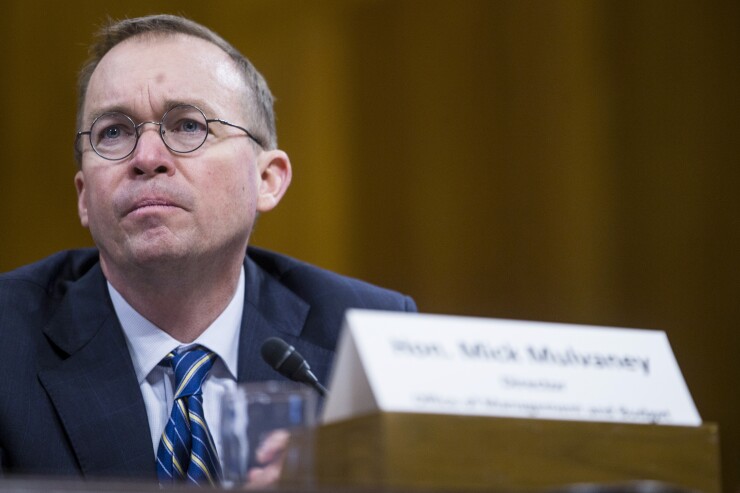When Mick Mulvaney first took the reins of the Consumer Financial Protection Bureau last year, he
“Rumors that I will set the place on fire or blow it up or lock the doors are false,” he said at his first press conference.
But if Congress were to somehow approve Mulvaney’s most recent proposal to restructure the agency, he might as well blow the place up, because there would be virtually nothing left for the CFPB to do.

On Monday, Mulvaney
This fourth suggestion, a version of the so-called REINS Act that some conservative Republicans have been pushing for years, is by far the most dangerous and far-reaching.
Mulvaney justifies it as a return to the Founding Fathers’ vision of America,
Yet if enacted, it would hurt everyone involved: the agency, the consumers it is supposed to protect and even the financial services industry it oversees.
For starters, the idea is wildly impractical, particularly in today’s hyperpartisan political climate. Congress simply doesn’t have the ability, much less the time, to preapprove every major rule of a federal agency. The result would be that the CFPB does no rulemaking of any kind.
That effectively neuters the agency, preventing it from writing rules targeting abuses in the marketplace. While bankers may be tempted to cheer such an outcome, it also prevents the agency from leveling the playing field with nonbanks, ensuring they face lighter regulation than financial institutions. Moreover, it prevents the agency from making fixes or providing clarity on regulations already in place. Such a scenario could quickly turn into a nightmare for lenders and borrowers, who would have to rely on distracted lawmakers to resolve a complex problem better handled by regulators on the ground.
As a philosophical matter, Mulvaney’s suggestion is also unnecessary. Congress already has the power to review all regulations after they come out. The Congressional Review Act gives it 60 legislative days — a far longer period of time than calendar days, often four months or longer — to overturn any recently enacted regulation by a federal agency. Moreover, Congress doesn’t even need a 60-vote supermajority. The law allows a simple majority vote in both chambers to reject a regulation.
Mulvaney knows this already. Congress
But therein lies the contradictory nature of Mulvaney’s arguments. Time and again, Mulvaney seeks to portray CFPB as a dangerously out-of-control agency with too few checks on its abilities.
“The bureau is far too powerful, and with precious little oversight of its activities,” Mulvaney wrote in the semiannual report to Congress.
And, to be sure, there is a case that Mulvaney’s predecessor, Richard Cordray, pushed the limits of his power. He targeted indirect auto lenders via guidance rather than a formal rulemaking process and he reinterpreted the Real Estate Settlement Procedures Act retroactively against the mortgage lender PHH, seeking a far higher penalty than what an administrative judge initially recommended.
But it’s worth noting that in the examples above, Cordray’s power was checked. The Government Accountability Office ruled that the indirect auto lending guidance should have been submitted to Congress for review as a regulation —
It’s misleading to repeatedly claim that the CFPB’s powers can’t be checked when they have already been by the safeguards in place. And while there’s a debate about whether further safeguards are necessary, that’s different than claiming none currently exist or recommending a step that would effectively neuter the agency.
Further, no other bank regulators have to follow such a setup, and despite claims that the CFPB is uniquely powerful, several other agencies are headed by single directors with similar abilities, including the Office of the Comptroller of the Currency and the Federal Housing Finance Agency.
Mulvaney’s proposal is a reminder of the problems that arise when those who are ideologically opposed to the mission of an agency are put in charge of it. As a congressman, Mulvaney jeered the existence of the CFPB, famously calling it a “sick, sad joke.”
As head of the agency, he’s carried forward those views, making it very clear he thinks the agency’s role is largely superfluous. He’s called for the CFPB to take a back seat to
If he had his way, that trend would continue well beyond his limited tenure. His proposal wouldn’t rein in the CFPB — it would shackle it in perpetuity.





